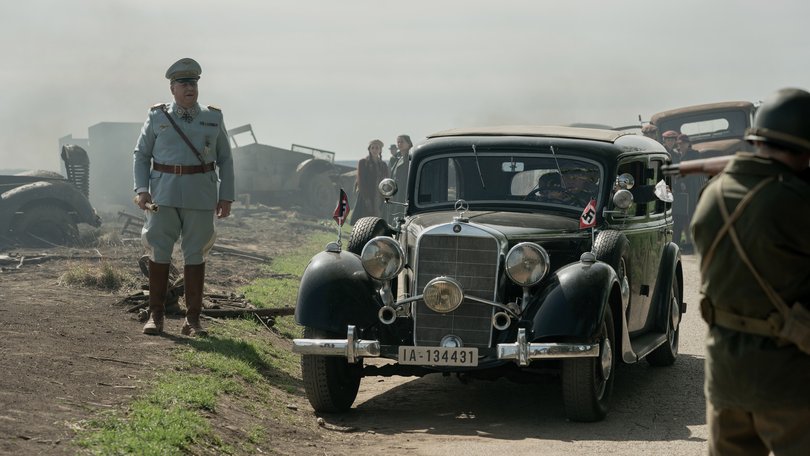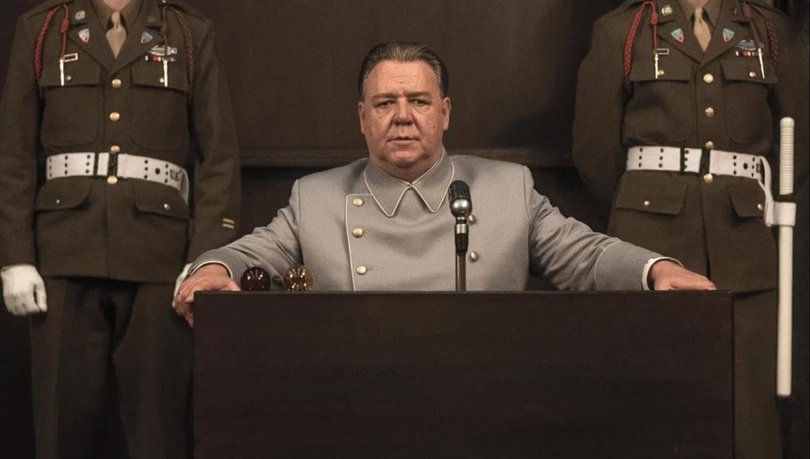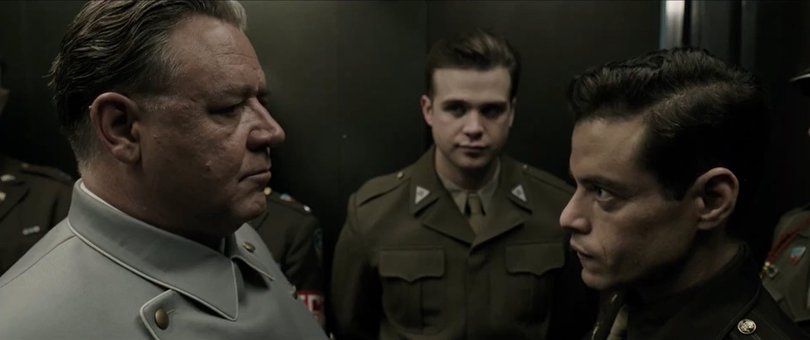THE WASHINGTON POST: Russell Crowe is terrifying as nazi high command in Toronto’s ‘Nuremberg’

It’s easy to think of Hermann Göring, Adolf Hitler’s right-hand man, and the other members of nazi high command convicted of crimes against humanity and sentenced to death in international court at the 1946 Nuremberg trials, as a monster.
What’s harder, though, is to think of him as a man — and an intensely, chillingly charming one, at that.
Forget how human these officers were, how utterly base their motivations for exterminating the Jews — desire for power, wanting to amass wealth, pure unfounded hatred — and we lose the thread of how to stop it from happening again.
Sign up to The Nightly's newsletters.
Get the first look at the digital newspaper, curated daily stories and breaking headlines delivered to your inbox.
By continuing you agree to our Terms and Privacy Policy.Or how that spread of hatred and the rise of fascism might already be happening again, right now.
That’s the urgent message of writer-director James Vanderbilt’s Nuremberg, which got an extended standing ovation after its world premiere Sunday night at the Toronto International Film Festival. (The gentleman next to me kept shouting, “Wowwwwww!!!!”)
The tightly paced jailhouse and courtroom thriller is steeped in Vanderbilt’s meticulous research of historical events and based on Jack El-Hai’s 2013 nonfiction bestseller, The nazi and the Psychiatrist.

It stars Russell Crowe as Göring and Rami Malek as Lt. Col. Douglas Kelley, the Army psychologist assigned to assess him as he awaits trial for war crimes, in a city where Hitler held mass rallies for the Third Reich.
The movie, which is scheduled to open November 7 in theatres, feels very of the moment, with its themes of how ordinary people can be capable of committing unspeakable evil.
“The reminder that these are human beings, and they made these decisions as a collective because that’s what they could get away with, is a very scary thing,” Crowe said in production notes provided to the press.
As Reichsmarschall Göring, Crowe is alternately towering and terrifying, mystifyingly funny and warm — a skilled social manipulator who lures Malek’s Kelley into his web of lies.
That viewers aren’t immune either to the charms of this unapologetic architect of the Holocaust may make this one of the most bone-chilling portrayals of a nazi ever depicted on screen.
It’s a powerhouse return to Oscars form for Crowe, who, to this non-German-speaker’s ear at least, speaks flawless German for at least the first 20 minutes of the 2½-hour film.
“Göring was someone who people describe as the first person you’d invite to a dinner party,” Malek said during the Q&A. “And so I thought, imagine being in the same room with that person, and then also (the) disparate aspect of him being a nazi, right?”
Kelley’s mission is, first, to make sure the nazis are psychologically fit to stand trial and that they do not try to escape judgement by committing suicide, as Hitler, Joseph Goebbels and Heinrich Himmler had all done. But Kelley’s research was also into the nature of evil itself, and what would drive men to commit such atrocities.
His unpopular conclusion, which led to him being ostracised for the rest of his career, was that there wasn’t anything particularly special about the nazis.
“What makes the Germans different from us?” Malek’s character asks in the film. It doesn’t seem pointed to another character, but to the audience.
Vanderbilt cast Crowe because he knew he wanted a charismatic movie star to play Göring.
Crowe had just finished playing Roger Ailes in the Showtime limited series “The Loudest Voice” in 2019 (for which he won the Golden Globe) and read the script on his way home to Australia.
He responded to it right away, diving into research and publicly announcing it as his next project even as funding was falling apart. That research would end up lasting five years.
He learned of how Göring had hailed from Germany’s upper middle class and been a flying ace in World War I, famous throughout Germany. How he was a man of incredible appetites, from his pill addiction to his mansion filled with art and jewellery stolen from Jewish Holocaust victims. How he founded the Gestapo as Prussian Minister of the Interior, and signed Reinhard Heydrich’s order for a “comprehensive plan for the Final Solution of the Jewish Question”, giving legal cover for the Holocaust. And how he claimed his antisemitism was merely practical, for his own gain.
“The distance you’ve got to take from your own humanity to say something like that is staggering,” Crowe says in the production notes.

The Göring he wanted to play wasn’t overtly aggressive, but simply insensitive to horror, capable of saying (and doing) evil things in an incredibly casual way.
“It’s a short Q&A, yeah?” Crowe said, jokingly, when asked how he figured out how to depict the character. “Okay, so we’re gonna have to get together tomorrow morning. It’ll probably take about two hours to (answer) that question. So bring some sandwiches and something to drink, and if you have toilet problems, please go before we start.”
Then he got serious, describing acting with this ensemble, which includes Michael Shannon, John Slattery, Richard E. Grant and Leo Woodall (The White Lotus), as walking into a Wild West saloon, where every single person is a gunfighter, willing to do exactly what is needed to survive the day.
He’d taken a chance on Vanderbilt, he said, purely because of the quality of the script. “The writing was magnificent,” he said. “And people kept saying, ‘But the money dropped out three times. How did you stay with it?’ It’s like, ‘Yeah, I’ve been around long enough to know that when something’s written really well, that’s a good . . . start. So you hang on to that.’”
The movie arrived in Toronto with some scepticism. This is only Vanderbilt’s second directorial effort, following 2014’s “Truth,” starring Cate Blanchett and Robert Redford, about the controversy that ended news anchor Dan Rather’s career. (He’s the screenwriter behind David Fincher’s “Zodiac” and “The Amazing Spider-Man” but has been working on this movie for 13 years.)
The trailers are Hollywood slick, suggesting either popcorn Oscars bait aimed at older Academy voters or a thriller in which Americans really get to stick it to the bad guy. And Crowe hasn’t had a good movie role in so long it felt like a welcome surprise to be reminded he’s great actor.
For this film, Vanderbilt envisioned a chamber drama about the mental sparring between two men in a jail cell, which, at times it is. But after 13 years spent combing through archives, researching Kelley and the 218-day Nuremberg trials, he kept broadening the scope.
He said in notes provided to the press that he’d been aiming for something like his favourite fact-based films, such as Oliver Stone’s JFK and Ron Howard’s Apollo 13, which manage to inform while also telling a riveting story.
The film also dives into the importance of the Nuremberg trials in establishing an international tribunal for prosecuting war crimes, when no case law or legal precedent had been written yet. The world had never before put the entire leadership of a country on public trial to answer for unspeakable atrocities.
And it does so with some levity from Shannon as Supreme Court Justice Robert H. Jackson, the chief prosecutor of the Nuremberg trials, who at one point guilts the pope into publicly supporting them, after pointing out that the Catholic Church was one of the earliest world entities to formally recognise the legitimacy of Hitler’s regime. “Did you just blackmail the pope?” his aide asks.
The same Holocaust footage shown during Göring’s trial is viewed here, presented with the original narration and without music. Vanderbilt had asked the cast not to watch any of it beforehand. Instead, he set up four cameras in the room, to capture their reactions as they were experiencing them. “We took a moment of silence, and then we rolled,” he said. “And it was a really hard day, but it was really important, I think, for all of us, to honor what had happened.”
Vanderbilt said in the Q&A that he’d worked so long on the film to honor his grandparents, who served in World War II. But the director, 49, was also was thinking of his children.
“I grew up hearing stories about (the war) and I had friends who lost family members in the Holocaust, and so for my generation, for me, it was a living thing,” he told the audience.
“It was something that I could touch. It felt like something that was tangible and really happened.”
Now his children can barely wrap their heads around the Holocaust let alone this six-month chapter of history between the end of the war and the execution of the nazi high command.
“It’s almost like talking to them about the American Revolution,” he continued. “The past grows farther and farther behind us, and so our efforts here tonight are to make that past come back alive, because there’s so much that we can learn from it.”
